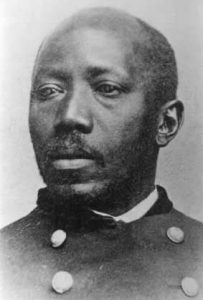Blog
Martin Delany – The first proponent black nationalism
- October 8, 2016
- Posted by: admin
- Category: Africa America History information Organisations Political system politics science Stoping the violence and promoting peace
Martin Robison Delany (May 6, 1812 – January 24, 1885) was an African-American abolitionist, journalist,  physician, and writer, and arguably the first proponent of black nationalism.
physician, and writer, and arguably the first proponent of black nationalism.
He was one of the first three black people admitted to Harvard Medical School.
He worked alongside Frederick Douglass to publish the North Star. Active in recruiting blacks for the United States Colored Troops, he was commissioned as a major, the first African-American field grade officer in the United States Army during the American Civil War.
After the Civil War, he worked for the Freedmen’s Bureau in the South, settling in South Carolina, where he became politically active.
After seeing the racism that constructed America’s political agenda, Delany came to a conclusion:
He became convinced that the white ruling class would not allow deserving persons of color to become leaders in society, and his opinions became more extreme.
His book, The Condition, Elevation, Emigration, and Destiny of the Colored People of the United States, Politically Considered (1852) argued that blacks had no future in the United States.
He suggested they should leave and found a new nation elsewhere, perhaps in the West Indies or South America. More moderate abolitionists were alienated by his position, and they resented his criticism of those who failed to hire colored men in their own businesses.
Delany criticized racial segregation among Freemasons, a fraternal organization.
‘In August 1854 Delany led the National Emigration Convention in Cleveland, Ohio.
Delany advanced his emigrationist argument in his manifesto “Political Destiny of the Colored Race on the American Continent”.
The convention approved a resolution stating, “[A]s men and equals, we demand every political right, privilege and position to which the whites are eligible in the United States, and we will either attain to these, or accept nothing.
“There were a significant number of women attendees who also voted for the resolution, considered the foundation of black nationalism.
Delany’s attempt to repatriate black Americans back to African:
In May 1859 Delany sailed from New York for Liberia, to investigate the possibility of a new black nation in the region.
He traveled in the area for nine months and signed an agreement with eight chiefs in the Abeokuta region that would permit settlers to live on “unused land” in return for applying their skills for the community’s good.
It is a question whether Delany and the chiefs shared the same concepts of land use.
The treaty was later dissolved due to warfare in the region, opposition by white missionaries, and the advent of the American Civil War.
In April 1860 Delany left Liberia for England, where he was honored by the International Statistical Congress. One American delegate walked out in protest.
At the end of 1860, Delany returned to the United States. The next year, he began planning settlement of Abeokuta. He gathered a group of potential settlers and funding.
When Delany decided to remain in the United States to work for emancipation of slaves, the pioneer plans fell apart.
Article taken from Wikipedia.org
